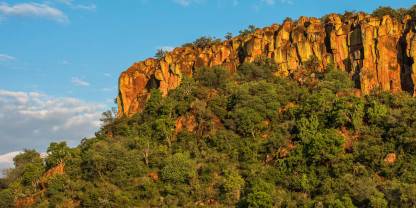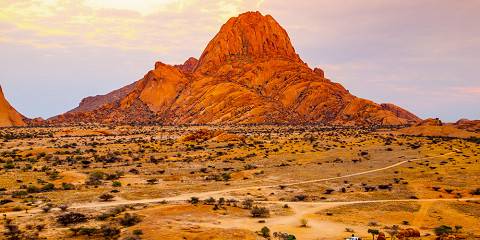Waterberg Plateau Park is a scenic wildlife-viewing and hiking destination. The park’s sandstone massif, which looms over the surrounding , has been protected as a breeding ground for threatened species such as white rhino, roan, sable and tsessebe. Self-drive safaris are prohibited, but guided are possible. There are nine short, self-guided walks available, as well as multiday trails.

-
Best Time To Go
- July to September (Best wildlife viewing)
-
High Season
- June to October (The park gets crowded)
-
Size
- 405km² / 156mi²
-
Altitude
-
1,403-1,884m /4,603-6,181ft
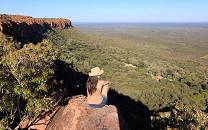 View Photos
View Photos
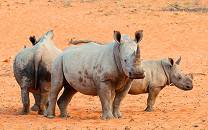 View Photos
+24
Photos
View Photos
+24
Photos
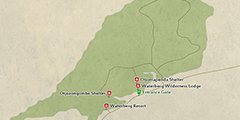 Open Map
Open Map
Pros & Cons
- Great wildlife viewing, including some rare species
- Opportunity to explore on foot
- and short, self-guided walking trails available
- Several accommodations in the park
- Self-drive is not allowed
- No lion, and sightings of other big cats are very rare
Wildlife
Many big safari animals are present in the park, including both white and black rhino. Several rare antelope species can be encountered, such as sable and roan, and eland, greater kudu and tsessebe are also present. Brown hyena and leopard are the main predators, although both are very difficult to see. There are no lions or elephants.
More about the Waterberg Plateau’s wildlifeScenery
Waterberg Plateau Park takes in a 50km-/31mi-long, 16km-/10mi-wide sandstone plateau that offers excellent views over the surrounding desert plains. The massif gets its name from the many springs that trickle down the red sandstone cliffs. The plateau features wooded areas as well as acacia bush and thick undergrowth.
Activities
Guided are the main activity in the park. Self-drive safaris are not permitted. Waterberg also has nine short walking trails close to the resort accommodations area. More challenging are the two four-day, 42km/26mi hiking trails: the Waterberg Unguided Hiking Trail and the guided Waterberg Wilderness Trail.
Weather & Climate
The elevated Waterberg Plateau experiences a cool, practically rain-free winter, which corresponds to the Dry season (May to October), and a hot summer with occasional rain, which marks the Wet season (November to April). The Dry season can get very cold in the early morning (averaging 5°C/41°F in June), so bring warm clothes if you’re visiting anytime from late May to early August.
More about the weather and climateBest Time To Visit
The drier months from July to September occur during the middle of Waterberg Plateau’s high season, but it’s worth paying extra for the great wildlife viewing that characterizes this period. There’s less foliage for the animals to disappear into, and they’re not as scattered as they are when the weather turns hot and wet.
More about the best time to visit
